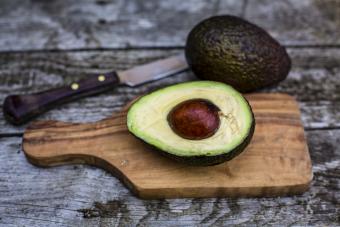
Avocados are loaded with nutrients, which is why including them in your daily meal plan is beneficial in more ways than one. Knowing all of the nutritional and health perks avocados have to offer may inspire you to incorporate these nutritious (and delicious) fruits into your daily eating regimen.
Calories in Avocados
Avocados aren't low-calorie foods, but it's because these fruits are loaded with heart-healthy fats. One avocado contains about 322 calories, according to the U.S. Department of Agriculture's national nutrient database. Many moderately active women require about 2,000 calories daily, and moderately active men often need about 2,500 calories per day, so eating an avocado a day fits into many heart-healthy meal plans. One-sixth of an avocado is equivalent to a 1 teaspoon serving size of oils, and the Dietary Guidelines for Americans 2020 recommend consuming 6 teaspoons of oils daily when following a 2,000-calorie diet (and 7 teaspoons of oils when eating 2,500 calories per day).
Macronutrients (Carbs, Protein, and Fat)
The main macronutrients found in avocadoes are carbohydrates (including fiber) and fat -- plus a little bit of protein. The USDA national nutrient database says one avocado provides 4 grams of protein, 30 grams of fat, and 17 grams of carbohydrates. It contains almost 14 grams of fiber as well. While avocadoes are a source of saturated and polyunsaturated fatty acids, the main fats found in this type of fruit are heart-healthy monounsaturated fatty acids (providing almost 20 grams of this fat). That's why eating avocadoes can help prevent chronic diseases like heart disease when eaten in place of saturated fats (found in high fat meats and full-fat dairy foods).
Micronutrients (Vitamins and Minerals)
Avocados are loaded with micronutrients (vitamins and minerals), which is why including them in your daily menus offers numerous nutritional benefits. Vitamins and minerals abundant in avocados include vitamin K, vitamin E, folate, and phosphorous. To reap the most nutritional benefits vitamins and minerals in avocados have to offer, eat avocados when they're ripe (soft but not mushy), and avoid cooking them.
Health Benefits of Avocados
You'll reap numerous health benefits (in addition to nutritional benefits) when you eat avocados regularly. For example, a 2013 review published in Critical Reviews in Food Science and Nutrition found avocados help promote healthy cholesterol levels, enhance the absorption of fat soluble vitamins, lower your risk for heart disease, and may support healthy aging and healthy weight management. So while avocados aren't a low-calorie food, choose them as your source of dietary fat in place of animal fats when possible to reap potential health benefits and lower disease risks.
Avocados and Diet Plans
Avocadoes can be included in just about any diet plan (Mediterranean diet, vegetarian diets, vegan meal plans, raw food diet, paleo diet, Weight Watchers meal plans, reduced-calorie diets, most phases of the Atkins diet, the Zone diet, the South Beach diet and vegetarian South Beach diets). The only diet you may have to limit avocados is phase 1 of the Atkins diet, where you're only allotted 20 grams of total carbs per day.
How Many Avocadoes Should I Eat?
Eating one-half to one whole avocado daily isn't an unreasonable goal when it comes to creating healthy daily meal plans. That's because 1/6th of an avocado equals a 1 teaspoon portion from the oils food group, and 2,000-calorie dieters should aim for 6 teaspoons of oils per day.







